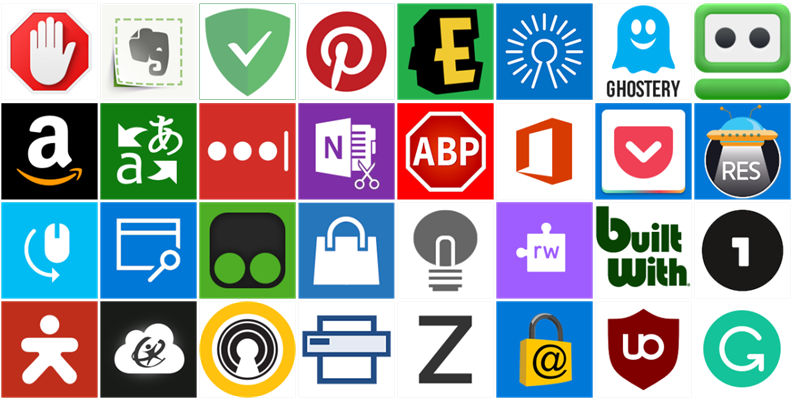We heard loud and clear that extensions like ad blockers, password managers, and key productivity enhancements are important to our customers to make the browser meet their needs. Throughout 2016, we worked closely with a small group of partners to launch a core set of highly-requested extensions through the Windows Store as part of the Windows 10 Anniversary Update. The first extensions in the Windows Store were AdBlock, Adblock Plus, Amazon Assistant, Evernote Web Clipper, LastPass, Mouse Gestures, Office Online, OneNote Web Clipper, Page Analyzer, Pinterest Save Button, Reddit Enhancement Suite, Save to Pocket and Translator for Microsoft Edge.

Enabling more powerful extensions
When we shipped this first batch of extensions, the response from our customers and enthusiasts was tremendous. Still, many of you were immediately ready for the list to grow, and have often asked when a personal favorite extension will show up.
Before we could enable a wider ecosystem of extensions for our customers, we needed to improve the capabilities of our extensions platform to allow new categories of extensions and more features for existing extensions. Over the past year, we’ve been focused on a few key engineering investments to add new capabilities:
- Native Messaging (supported from EdgeHTML 15) allows an extension to communicate with a UWP application installed on the system, enabling apps to integrate with more sophisticated functionality outside of the browser, which enables more advanced password management and other features.
- Bookmarks (supported from EdgeHTML 15) allowing an to access your favorites (with associated permissions.)
- Improved APIs – In addition to new APIs like bookmarks, we improved and fleshed out the existing API classes already supported, which combined meant we support over 30% more APIs than in the initial release.
- Fundamentals – Astute observers of our release notes and active testers in the Insider program may have noticed that some preview builds break extensions temporarily. The Insider program is key for us to see how experimental features are working on a build with real users, including helping us where we were falling short. We have used that data to improve the reliability and performance of our extension platform and will continue to focus on improving these fundamentals in future releases.
We’re always evaluating additional API support for future releases. You can see the extensions APIs that we currently support at our Extension API roadmap, as well as those that are under consideration (for example, Downloads and Notifications). We’re keen to hear your feedback on what’s most important to your extensions – let us know on UserVoice or via Twitter at MSEdgeDev.
Building a thoughtfully curated ecosystem
We have taken a purposefully metered approach as we onboard new extensions. Extensions are one of the most substantial features in a new browser, and we have a high bar for quality. Because extensions interact so closely with the browser, we have been very attuned to the security, performance, and reliability of Microsoft Edge with these extensions enabled. Starting with a small group of the most popularly requested extensions has allowed us to mature our extension ecosystem as alongside our extension platform, as well as to build a smooth onboarding experience for developers over time.
As we’ve continued to work on the extensions platform, we sometimes get questions asking why the list of extensions isn’t growing faster. What gives?
We are extremely sensitive to the potential impact of extensions on your browsing experience and want to make sure that the extensions we do allow are high-quality and trustworthy. We want Microsoft Edge to be your favorite browser, with the fundamentals you expect – speed, power efficiency, reliability, security. Poorly written or even malicious add-ons for browsers remain a potential source of privacy, security, reliability and performance issues, even today. We want users to be confident that they can trust extensions in Microsoft to operate as expected. As such, we continue to evaluate each extension submission to ensure that it will bring value to our users and support our goals for a healthy ecosystem.
A growing catalog of trusted extensions
Today, in the Windows Store, our partners are offering over 70 extensions worldwide, and are adding more every week – including popular extensions like Grammarly, which launched earlier this week! As this list grows, we will continue to preview new functionality and experimental extensions starting with Windows Insiders for testing and feedback, followed by a broader release via the Windows Store, to ensure the quality of the end-to-end experience.
Looking forward, we continue to work closely with our developer partners to onboard new extensions into the Store. We continue to prioritize what APIs we should support, and what partners we should work with from user feedback, so please keep it coming! Thanks to our users and partners for a great year!
– Colleen Williams, Senior Program Manager, Microsoft Edge
